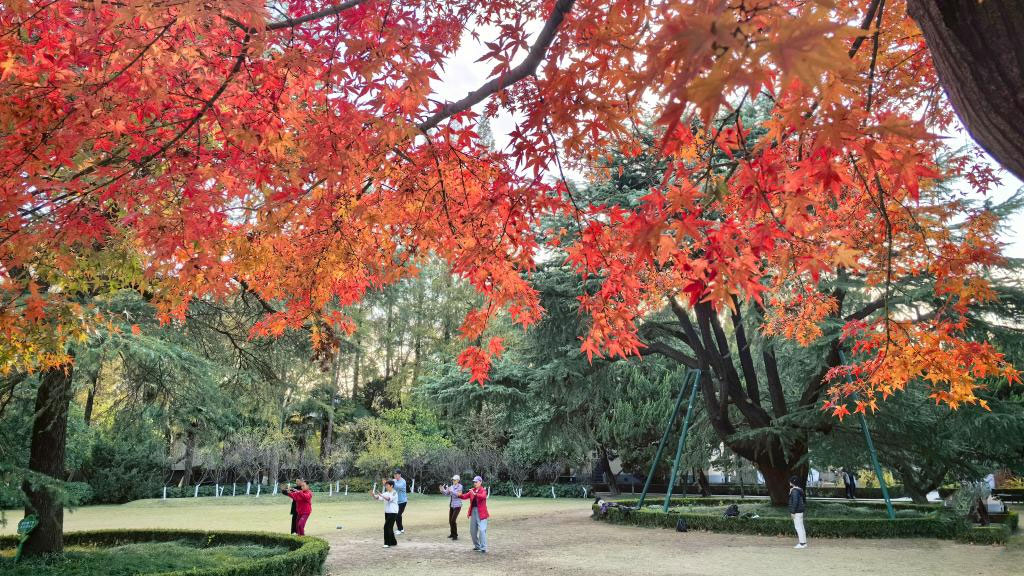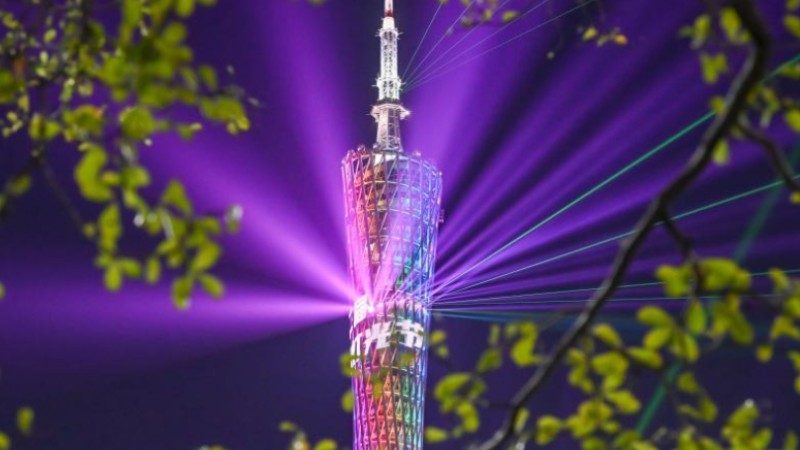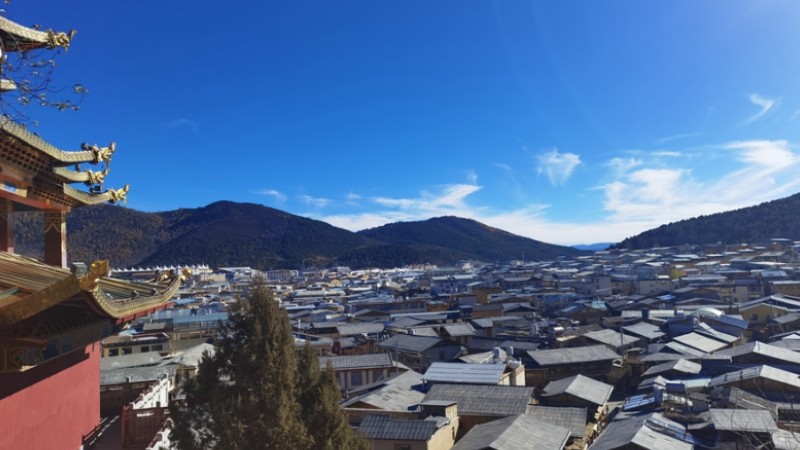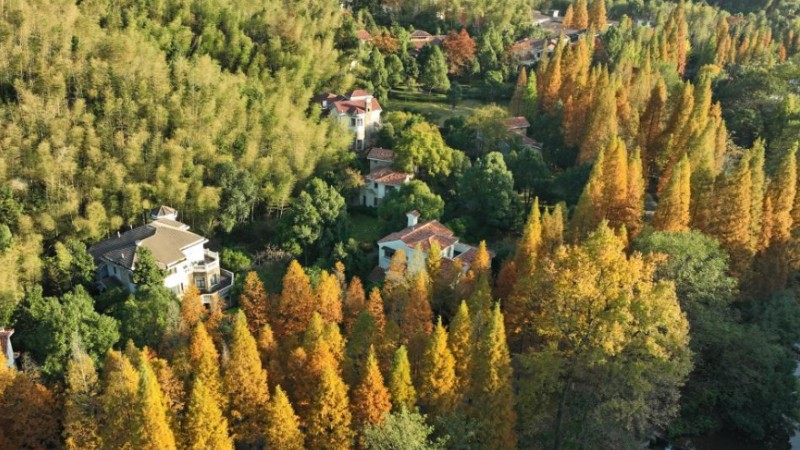Lucy Hamilton: Connecting cultures through the power of poetry
"Poetry is a kind of distillation of people's experiences, so it finds the crucial aspects of everything. To have poetry from China translated and vice versa is very important for the understanding between cultures, both historically and going forward.”
On a sunny day in Cambridge, People's Daily Online interviewed the award-winning poet, Lucy Hamilton. Hamilton’s poetry has won several prizes, including, most recently, a poem that was inspired by her travels in China and the Chinese classic "Book of Changes."
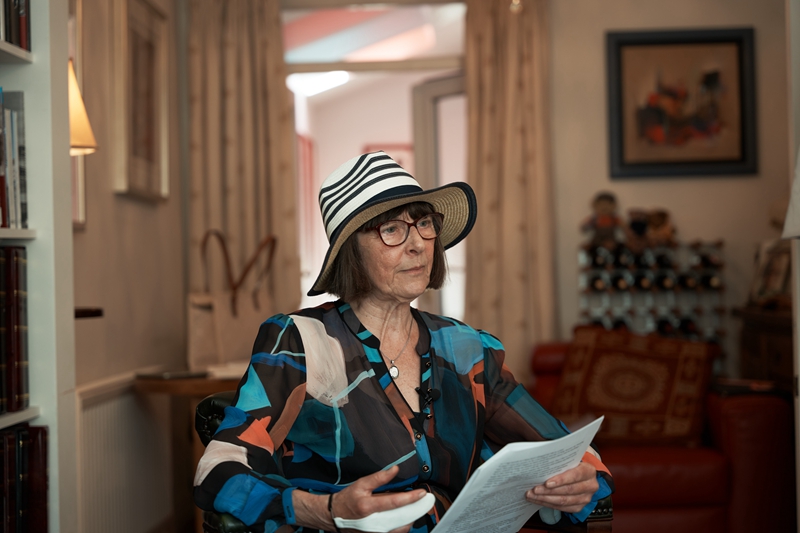
Lucy Hamilton. (photo/Jedrek Ko)
Hamilton was the co-editor at Long Poem Magazine for 10 years and, since 2015, has been the senior literary editor at Cam Rivers Publishing, working in this capacity with several famous Chinese poets. Recently, Hamilton attended the 9th Cambridge Xu Zhimo Poetry & Arts Festival, where she was awarded the Xu Zhimo Lifelong Achievement Award in the literature category. Hamilton believes that poetry connects people from diverse cultures, and allows them to better understand one another.
Connecting people's hearts through poetry
“Now Zhou Zhou applies pressure to my wrists and feet asking if I feel pain/before she inserts needles at meridian points…” During the 9th Cambridge Xu Zhimo Poetry & Arts Festival on Sept. 15, Hamilton read her poem “Acupuncture at Bamboo Bridge.” Hamilton was awarded the Xu Zhimo Lifelong Achievement Award by Professor Alan Macfarlane FBA, Chair of the festival, and Fellow of King’s College, Cambridge. She considers it a great honor to participate in the festival every year, which she believes is a wonderful opportunity to exchange ideas between Chinese and Western poets and artists. The festival not only explores poetry, literature, and art, but also provides forums for lively discussions between participating contributors and their audiences. Hamilton believes that “in these volatile economic and political times, art and the spiritual life need to be constant and shared in the spirit of mutual exploration and respect.”
Looking back at her encounters with Chinese poets at the festival, Hamilton said that meeting the leading Chinese female poet, Shu Ting, was deeply inspiring, after falling in love with her poem “To the Oak Tree,” written in the 1970s. The poem takes a feminist viewpoint, rejecting conventional beliefs about romantic love, and pursuing equal love between partners. Hamilton also enjoys the work of many other contemporary Chinese poets, such as Yang Ke, Jidi Majia, and Bei Dao. Hamilton is constantly enchanted and moved by ancient Chinese poets like Du Fu and Li Bai. “They take you into other worlds and other times,” she said, “Similar to what the Greek poet, Sappho, does through her poetry. You are taken into the atmosphere of those worlds: rivers, mist, and mountains in the varied landscapes of China. You also get a sense of the huge distances travelled in these ancient times, the great loneliness and the sense of isolation, as well as the longing for homelands, for seeing friends, family and children.”
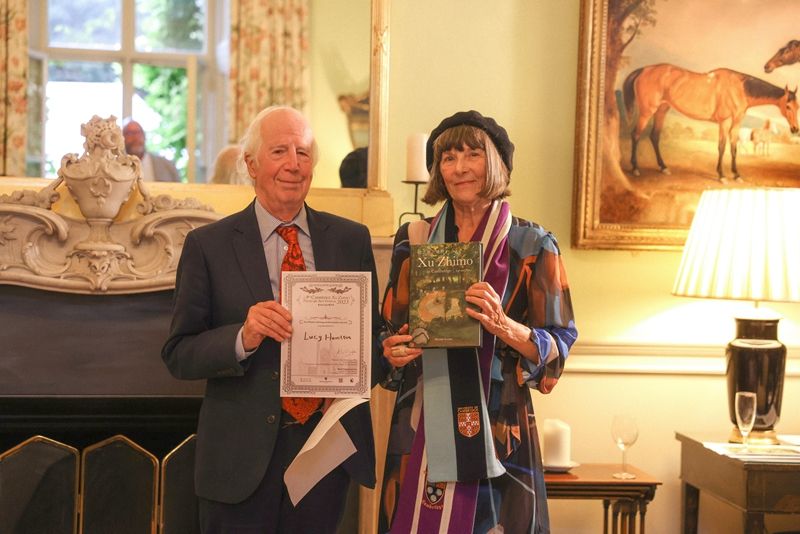
Hamilton is awarded the Xu Zhimo Lifelong Achievement Award by Professor Alan Macfarlane. (Photo/Yushan)
As the senior literary editor at Cam Rivers Publishing, Hamilton has edited several well-known Chinese poets’ collections, including Yang Ke’s “Journey without Destination.” Yang Ke began writing urban poetry in the 1990s. He not only scrutinized daily life in the city but also focused on exploring the grand backdrop of China’s transformation from an agricultural society to a consumerist society. In his poem “I Came Across a Small Rice Field in Dongguan,” Yang Ke wrote: “Yesterday, I would never have guessed/that in Dongguan/I could have come across a small field of rice/ The yellow-green spikes/continued to sway/through moments both happy and sad.”
One of the features of Chinese poetry that Hamilton loves is the imagery. “It is as if a single word can look out in all directions, with all the senses at the same time, like being in a landscape or placing oneself imaginatively in a traditional Chinese painting. With European languages, one often needs so many words, so that is a significant difference,” she said.
Poems inspired by travels in China
Hamilton spoke of her first trip to China in 2017 when, at the invitation of the Chinese poet Jidi Majia, she participated in his annual poetry festival in Xichang, southwest China’s Sichuan Province. Along with Jidi Majia, Hamilton met a large team of international poets and artists, and together they visited the wetlands and stayed nights in the mountains. She also experienced various Chinese cultural festivals. “This was my first experience of the tremendous hospitality and generosity of the Chinese, which I later found in Fuzhou and indeed everywhere I went in China,” she recalled.
For the Tang Xianzu International Cultural Exchange project in 2019, Hamilton visited Fuzhou and watched a performance of Tang Xianzu’s masterpiece, “The Peony Pavilion.” She also enjoyed the productions of “Romeo and Juliet” and “Hamlet” performed at the Cambridge Shakespeare Festival. Hamilton commented: “‘The Peony Pavilion’ is based on Confucian moral tradition and filial duty; ‘Romeo and Juliet’ is based on the tradition of noble English families and the feud between two families with the moral that petty squabbles and conflict can lead to tragedy. I loved the performance of ‘The Peony Pavilion’ with silk costumes and stylized movements, quite different from the productions of Shakespeare.”
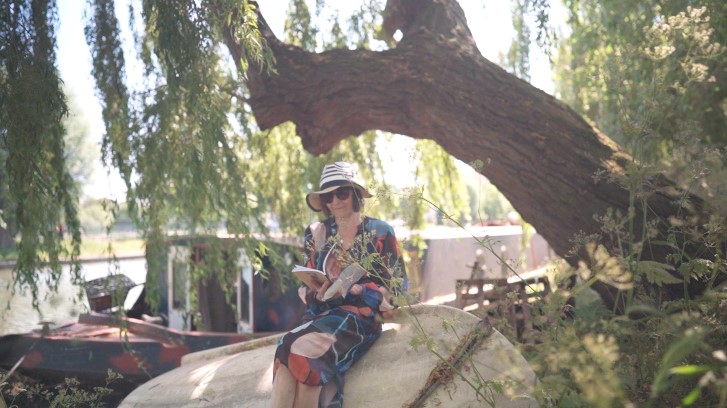
Hamilton reads by the River Cam. (Photo/Jedrek Koh)
During her time in Fuzhou, Hamilton met many local artists and artisans. These included the master weaver Xu Jianyuan, who was making a three-meter bamboo vase. He demonstrated the process of making the vase first by soaking the bamboo, splitting it by hand, dying the material and then weaving it into a vase. She wrote a poem inspired by this experience called “The Master Craftsman Weaves a Bamboo Vase” which ends with the couplet: “Now he takes up a black-dyed strand to complete/the face of the First Emperor/interlacing his memory.”
Hamilton also met the ceramicist Professor Gan Daofu when she visited Jingdezhen, renowned as the "Porcelain Capital" due to its thousand-year history of producing Chinese ceramics. In Professor Gan’s studio, Hamilton tried her hand at writing poetry with a brush on ceramics for the first time, and the experience proved to be truly magical. In addition to his role at Jingdezhen Ceramic University, Professor Gan also conducts ceramics classes for children during the summer vacation. He aspires to establish a cooperative that celebrates various forms of art.
“I want to imitate the bees/to be an envoy of the visible to where there is neither a here/nor a beyond but the great unity.” In 2020, Hamilton’s poem, “Messengers,” was awarded First Prize by Artemis Poetry. The poem was inspired by her experience at the Tea Mountain near the mesmerizing West Lake in Hangzhou. Hamilton recalled: “I was amazed by the visual panorama of giant lotuses on the lake, surrounded by mountains with the city skyscrapers in the distance. At the Tea Mountain, I had a tactile experience of touching the tea bud and being fully immersed in the magical scenery. On my way back, I noticed a bee box, which releases bees to pollenate the tea flowers. This led me to write "Messengers," where I quote Rilke as he considers bees as envoys between the visible and the invisible and reflects on the unity in the natural world.”
Hamilton hopes to continue and extend her collaborations and exchanges with poets and artists from China and other parts of the world, building new friendships in the process. As a poet and editor, she looks forward to celebrating Chinese culture, promoting cross-cultural collaborations, and fostering cultural exchange between China and the West through the art of poetry.
Photos
Related Stories
- How many possibilities are there in poetry? Qianye's poetry Labyrinth
- Poem lover keeps spending spare time to pursue passion for poetry
- American writer salutes Chinese poetry with whiskey
- Poetry festival commemorating great Chinese poet Li Bai opens in east China
- Interest in classical Chinese poetry should be cultivated: poll
- Teenaged poetry champion Wu Yishu reflects China’s rising interest in traditional culture
- Battle of words over the future of poetry
Copyright © 2023 People's Daily Online. All Rights Reserved.






